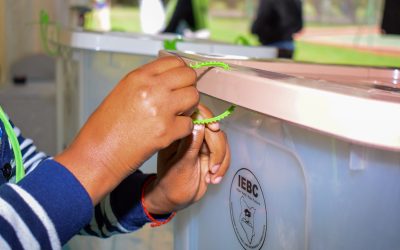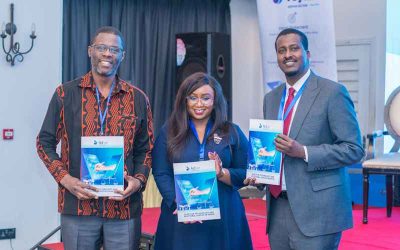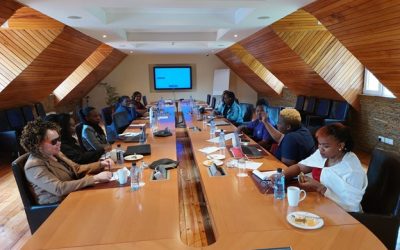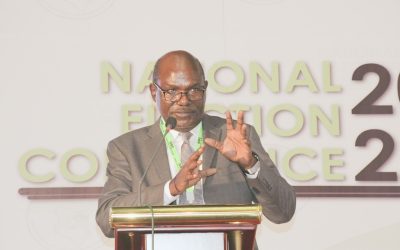KICTANet Election Technology Observer Mission
Read the Pre-election Observations Report on Kenya’s August 2022 Elections. (August 8th, 2022.)
Read the summary of the key findings of tech election observation mission. (August 30th, 2022)
In our civic duty as active and engaged citizens, KICTANet has deployed election observers to observe the tech component of Kenya elections since 2013. The year 2022 is no different, and KICTANet will also observe the technology component of the elections nationwide from preparedness, the voting process, transmission, and post-election processes. We have deployed 90 observers from 21 counties.
The KICTANet technology election observers’ mission will provide a neutral and balanced impartial review of the election process and prepare a report that will be published on the KICTANet website.
Challenges with the 2022 elections – Key issues that have not been addressed.
1. Provide a public API to IEBC results system, to enable observers and other stakeholders to access the database and carry out results analytics.
2. Grant observers access to back-room server operations on the processing of results forms.
3. Ensure that the use of manual registers is supported by the expected documentary evidence as per IEBC regulations (such as approvals from Presiding Officers, and completion of requisite forms).
4. Transmit and display both text results and scanned result forms for all the elective positions in all polling stations to enhance transparency and verifiability of the elections.
5. Publish the data protection impact assessment report and privacy policy.
6. Ensure all technologies and devices to be used in the elections are all tested prior to
deployment to ensure sufficient performance.
7. Ensure comprehensive training of all election personnel well before the elections, especially on the aspects of the use of technology and devices.
8. Collaborate with electricity and telecommunications providers to ensure robust network and coverage during the elections, including ensuring that satellite backup is used in areas without 3G/4G network coverage.
9. Incorporate cyber hygiene, digital security and privacy in the curriculum used for the training of election officials.
10. Take measures to prevent vendor lock-in the acquisition and maintenance of technology infrastructure.
11. Social media companies should take measures to address rising hate speech, misinformation and disinformation on their platforms.
12. IEBC should respond in a timely manner to address any misinformation and disinformation targeting them.
Areas of elections that we are observing.
- Technology deployment and preparedness of the electoral body
- Voter registration process
- Elections day opening of polling stations
- The identification process of voters
- Elections polling station closing
- Elections Tallying centre
- Availability of infrastructures like power, cellular network, mobile signal, internet, and online services like social media sites, and search engines, in voting and tallying centres.
What have we done so far?
- Weekly articles on tech preparedness on elections and shared widely.
- Courtesy call with IEBC commissioners.
- Held a moderated discussion with the public on election preparedness and their expectations for the elections and shared it with IEBC.
- Participated in the 2022 National Election Conference.
- Meeting with European Union Election Observation Mission.
- Held Public engagement with Meta Platform Inc, Twitter, and Tiktok on the emerging Concerns on social media use in the Upcoming 2022 Elections.
- Training our observers on the election process, and the technology component on 26th July and 4th August 2022 from 2pm.
- INTERNET SHUTDOWN: Together with AccessNow, and the #KeepItOn campaign, Trained observers on internet measurements (OONI Probe) and use of VPNs and other tools in case of Internet Shutdowns (TunnelBear, Psiphon, Tor).
Our election observers are bound by the IEBC code of conduct, and KICTANet’s core values of independent, transparent, multistakeholderism, diversity, professionalism, impactful, integrity, excellence, and discipline.
Election Integrity in Kenya: Countering Misinformation for a Strong Democracy
In the fast-paced and interconnected world of technology, misinformation has become a pervasive threat, and no sphere is immune, including the political landscape. In the wake of the August 2022 General Elections in Kenya, the impact of misinformation and...
Election Dispute – Should We Open The Server #Fungua_Server?
By John Walubengo I have tried to keep off the current ‘Open-Server’ chorus and anti-chorus from the political class for two reasons. The first is that I and two others happen to have been involved quite closely with the Presidential Petition 2022, from a technical...
Fake Academic Certificates: How to Deal With Them
By John Walubengo Kenya's 2022 Elections witnessed a fair share of educational certificates saga. Having a university degree was a prerequisite to being a candidate for some of the top seats in the country, and there was a lot of doubt about whether some candidates...
AJC2022: ICJ Kenya Carries out African Post-Election Review
By John Walubengo The Kenyan Section of the International Commission of Jurists (ICJ Kenya) organized and hosted its Annual Jurists Conference (AJC) 2022 on the theme, "Reflections on Electoral Democracy in Africa: Trends in Judicial Decisions, Challenges, and...
Examining Online Gender-Based Violence on Female Politicians and Leaders in Kenya
By Florence Awino and Neema Mujesia On 5th October 2022, KICTANet attended a workshop organized by Pollicy in conjunction with CREAW Kenya to assess the impact of online gender-based violence on female politicians and leaders. This meeting, moderated by Irene Mwendwa...
IEBC Technologies – What Next?
By John Walubengo After getting a clean bill of health from the Supreme court regarding their technology infrastructure, IEBC must be enjoying their rare badge of approval. A week later, the new President also commended them and promised to ensure they have enough...
KICTANet Research and Publications related to elections.
|
Kenyans went to the polls on August 9, 2022! KICTANet monitored the election, focusing on technology. KICTANet’s election observation mission report highlights positive steps like sufficient voting tech, voter identification using fingerprints, and electronic transmission of results. | 1074 downloads | Download | 247.2 KB |
|
KICTANet's Pre-election Observations Report on Kenya’s August 2022 Elections recommendations to improve future elections. The report proposes giving the public access to election data, stronger security checks, and better voter education. Read the full report for all the proposed recommendations. | 2260 downloads | Download | 791.2 KB |
|
This brief examines the severe repercussions on civil liberties, economic stability, and social cohesion. It underscores the imperative for robust policies that safeguard uninterrupted digital access as a fundamental right for all Africans.
| 640 downloads | Download | 392.6 KB |
|
This research examines how disinformation shapes Kenya's political scene. It exposes the rampant use of misinformation at both national and local levels, targeting a diverse electorate with varying ideologies, ethnicities, economic backgrounds, and demographics. Politicians exploit these divisions to manipulate voters. | 2434 downloads | Download | 15.4 MB |
|
Kenya debates solutions to combat fake news. Ideas include:
These efforts address the root causes and empower Kenyans to identify and avoid fake news. | 2299 downloads | Download | 486.6 KB |
| The Kenya ICT Action Network (KICTANet) deployed a 25-person election observer mission for Kenya’s 2017 General Election that took place on August 8, 2017. Kenyans voted for six positions namely Presidential, Senate, Parliamentary, Women’s Representative, Governor, and Member of County Assembly. KICTANet’s observation focused specifically on the use of technology from a user perspective and accordingly released a preliminary report which was published on 11 August 2017. | 1033 downloads | Download | 207.1 KB |
| 992 downloads | Download | 374.5 KB | |
![]()







